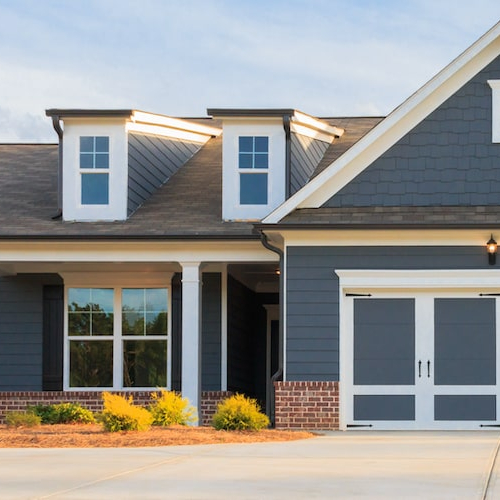What is a co-op and how does it work?
Mar 5, 2024
•6-minute read

Have you ever asked these questions about co-ops: What is a co-op? How is living in a co-op different from living in a condominium or an ordinary single-family apartment? And what does it mean to be part of a housing cooperative? These are all good questions about the mechanics of co-ops that we can provide answers to.
In some ways, co-op housing operates similarly to condo living. But at the same time, it’s worth noting they are not the same. Let’s take a closer look at this alternative homeownership model and explore what a co-op is.
Definition and types
Cooperative housing, commonly known as a co-op, is a popular housing model you’ll find in major cities like New York City. Tenants or members collectively own and share responsibility for an entire building or property.
When you buy into a co-op, you’re not purchasing a piece of property or unit in a building. You’re buying shares in the nonprofit corporation that owns the building. You’ll receive stock instead of a title as you would with a traditional home purchase.
A co-op’s ownership structure makes this a unique housing option, with its focus on shared ownership and collaboration to run the property.
Different types of co-ops
There are many different types of co-ops. You may encounter consumer cooperatives, worker cooperatives, producer cooperatives and more. As a general rule, each exists to help people with shared interests work toward a common goal.
Co-ops are typically apartments in large buildings, particularly in big cities. However, several other co-op housing types exist, including the following:
- Townhouses
- Duplexes
- Single-family homes
- Manufactured homes
- Clusters of tiny houses on co-op land
Buying a condo vs. co-op
Despite what many believe are their similarities, condos and co-ops operate differently.
Let’s compare the major differences between buying a condo versus a co-op.
Buying a condo
When you buy an apartment or condo, you buy the interior contents behind a numbered door – one of many individual units. What you own is the individual unit in the building. Because you hold the deed to your unit, you’ll benefit from any equity or additional value the unit accrues.
As a bonus, you may enjoy some flexibility when you want to renovate, upgrade or perform DIY updates in your condo unit. It’s also generally easier to finance the purchase of a condo than a co-op.
Buying a co-op
When you buy into a co-op, you purchase shares in the corporation that owns the property. In a co-op, all residents are shareholders, and the size of your apartment typically determines your stake in the building.
All co-op residents can access common areas in the building, and they all share in the expenses and maintenance of the property.
In other words, you pay for the right to live in an individual unit, but you don’t own the unit outright. And your ability to upgrade, add on to or renovate your apartment may be limited.
Buying a co-op typically involves a demanding application process, including an interview with a co-op board. The board may ask you to submit character references and require financial vetting before approving you to purchase shares.
You should also know that you usually can’t finance a co-op with a traditional mortgage. Co-ops require special financing because the buyer is purchasing stock in the company that owns the building, not an individual unit. Rocket Mortgage® only offers co-op financing in certain areas of New York state.
Most mortgage lenders must approve the building in addition to the borrower. Because co-op buildings are considered non-warrantable, the lender must review the board of directors and the building’s mortgage.
Purchasing a condo with traditional financing can offer many of the same benefits as co-op living. You can enjoy a more conventional financing process – including the ability to make your purchase offer more compelling with a Verified Approval Letter.1
How does co-op housing work?
A co-op is a nonprofit organization with shareholders and an elected board of directors and may have committees or hire professionals to keep the co-op running smoothly.
Here’s a breakdown of the entities you can find in a co-op:
- The board of directors: The board of directors makes decisions in the co-op’s best interest guided by its bylaws and established policies. Shareholders vote on all rules and restrictions.
- The co-op association: This entity manages and collects membership The money covers property taxes, building maintenance, amenities and any mortgages attached to the property.
- Shareholders: Shareholders buy into a co-op. They own a portion of the company that owns the building. All co-op owners are responsible for the co-op’s financial Shareholder payments usually cover common expenses, such as building maintenance and upkeep, renovations or improvements to common areas, underlying property mortgages and more.
- A management company: The co-op board may hire a management company for day-to-day issues such as building maintenance.
Advantages and disadvantages of co-op Living
As with any type of housing, co-op living has upsides and downsides you should know before buying one.
Pros of co-ops
- Lower purchase price: If you live in a major city, like Washington, D.C., or New York City, you’ll generally find that co-ops are slightly cheaper and require fewer closing costs than condos.
- Less responsibility: If you’ve ever owned a piece of property, you know you’re responsible for maintenance. Owning a co-op apartment may feel like renting because you aren’t responsible for maintenance beyond your unit.
- Better insight into your neighbors: During the interview process, you can ask the board questions to gather insight into the community you may be joining. Ask questions that reveal their values and interests.
- Tax benefits: In certain areas, you may be allowed to deduct interest on your loan for your share of the property and your share of the interest on the blanket mortgage for the building. Some maintenance fees may be tax deductible, too. If you have questions, contact a qualified tax professional.
Cons of co-ops
- Higher monthly fees: Although the purchase price of a co-op is often lower than a condo, the minimum down payment is typically higher. Also, a co-op’s monthly expenses and charges are typically higher because they cover building utilities and property taxes.
- Greater restrictions: Co-op bylaws will detail what is and isn’t permissible. They may include rules that prohibit subletting or restrict renovations.
- Limited buying pool: Sometimes, co-op bylaws set significant restrictions on shareholders’ ability to resell their shares and divest their real estate holdings.
Cooperative housing FAQs
We answer some frequently asked questions to help you decide whether co-op housing is right for you.
What’s the difference between a condo and a co-op?
The major difference between a condo and a co-op comes down to ownership – whether you own an individual unit (like a condo) or own shares in a building (like a co-op).
Condos typically give owners more flexibility to renovate – and they’re easier to finance. Co-ops are generally stricter about renovations and buyer approval.
Should I buy a co-op?
Buying a co-op will depend on your circumstances. Ask yourself if the ownership structure works for your lifestyle and long-term goals. Co-ops require collaborative involvement in decision-making and building operations. You may not be able to finance your purchase with a traditional mortgage, and the co-op’s bylaws may limit what you can and can’t do in your unit.
You’ll need to consider these factors – including how hard it may be to resell your shares or how hard it may be to rent your co-op if you’re considering purchasing one to invest in real estate.
Can I finance a co-op purchase with a mortgage?
Co-op financing differs from financing for a traditional home because co-op owners don’t own the real estate. To finance with a co-op loan, a lender will review a co-op’s operations, its board of directors and the property’s underlying mortgage.
The bottom line
When you buy into a co-op, you invest in shares of a housing cooperative rather than own property. Co-ops are different from condos. They can be apartment buildings, duplexes, townhomes and other traditional residential structures – but they operate under different rules.
Co-ops are generally considered more affordable housing in major cities. However, their governing boards and bylaws typically place many restrictions on co-op owners' rights. Take ample time to do your research before renting or buying a co-op.
Rocket Mortgage only offers co-op loans in specific areas of New York state. If you’re ready to buy a co-op in an eligible area, start the approval process with a Home Loan Expert today.
1 Participation in the Verified Approval program is based on an underwriter’s comprehensive analysis of your credit, income, employment status, assets and debt. If new information materially changes the underwriting decision resulting in a denial of your credit request, if the loan fails to close for a reason outside of Rocket Mortgage’s control, including, but not limited to satisfactory insurance, appraisal and title report/search, or if you no longer want to proceed with the loan, your participation in the program will be discontinued. If your eligibility in the program does not change and your mortgage loan does not close due to a Rocket Mortgage error, you will receive the $1,000. Client must submit the claim to Help@RocketMortgage.com or contact Client Relations at 1-800-863-4332 to complete and return a claim form to Client Relations in order to claim the $1,000. Additional information will be required for tax purposes. This offer does not apply to new purchase loans submitted to Rocket Mortgage through a mortgage broker. Rocket Mortgage reserves the right to cancel this offer at any time. Acceptance of this offer constitutes the acceptance of these terms and conditions, which are subject to change at the sole discretion of Rocket Mortgage. Additional conditions or exclusions may apply.

Victoria Araj
Victoria is a former Team Leader of editorial content at Rocket Mortgage and she held roles in mortgage banking, public relations and more in her 19+ years with the company. She holds a bachelor’s degree in journalism with an emphasis in political science from Michigan State University, and a master’s degree in public administration from the University of Michigan.
Related resources

12-minute read
20 popular types of houses and home styles
We rounded up the most common types of houses and provided their key features, pros, cons and photos so you can find the home style that best fits you.
Read more

6-minute read
10 most expensive cities in the US
Curious about the most expensive cities in the U.S.? Learn about the most expensive places to live in the U.S. and some of their unique characteristics here.
Read more
11-minute read
The salary needed to live in the top 10 most sought-after cities in the U.S.
The demand for a house is rising. See the cities with the highest demand, the salary you’d need to live there and tips to make homeownership happen.
Read more